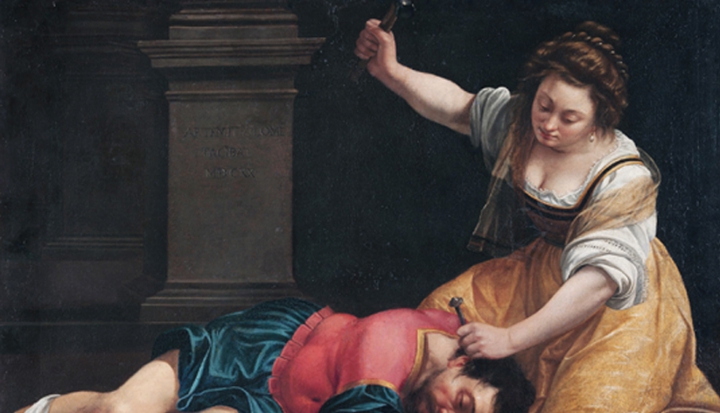You may have seen the bumper sticker: “Eve was framed.” The biblical perspective on women is set at a rather low bar in the opening chapters of Genesis. Simply put, it suggests women are the problem. If they weren’t inherently weak, morally suggestible, and all-out power hungry, the world would be a paradise right now.
Does anybody still believe this? Did anybody buy this story, ever? Obviously somebody did, or the Eden saga wouldn’t unfold as it does. But from where I sit as a card-carrying female, it seems clear that weak, suggestible, power-hungry folks show up regularly in both genders. Spend an hour with the parish council if you don’t believe me. It’s not right that Eve takes the fall for the Fall, as she does in the minds of many. Despite the fact that in the story God acknowledges both humans as culpable, and both are punished and banished.
Does the initial biblical portrait of womankind attach to females throughout scripture? “Weak and suggestible” doesn’t fit wives like Sarah, who laughs at the notion of an octogenarian pregnancy even when predicted by a heavenly messenger. Once she knew heaven has promised her husband offspring, however, she got to work procuring a fertile bunkmate for him. Sure, it doesn’t work out so well for Hagar, Ishmael, or even Sarah in the long run. But it’s impossible to view Sarah as weak or uncooperative in her third-party perception of the plan. Maybe this is why later supernatural pregnancies involve the female in the conversation more directly.
Weak and suggestible is also not an apt description of Rebekah, who shows more resolve in an hour than her husband Isaac does in his entire history. Having mothered her twins for decades, Rebekah recognizes that Jacob, not Esau, is the more resourceful leader—Esau’s primacy from the womb notwithstanding. So she finds a way to separate the elder from his birthright and sets the future of Israel on its astonishing, some might say destined, trajectory. The loss of her favorite son is the price of this mother’s act, which surely does not benefit Rebekah nor endear her to her dying husband and remaining son.
Jacob’s wives Leah and Rachel—relatives of Rebekah—demonstrate similar resourcefulness in procuring their children’s place in the lineage. Rachel pays mightily for this privilege, twice, the second time by her death. Labeling her power-hungry would be a gross misreading.
These depictions of matriarchs from Genesis are certainly not weak, though these women are routinely lumped into the “morally shady” category, still bearing the taint of Eve. A category that, we should hasten to add, suits their husbands at least as well. Abraham and Isaac both lie about their relationship to their attractive wives to save their own skins in foreign territory. Jacob is morally flexible enough to deceive his brother and uncle without losing sleep over it.
Biblical women fight and often defeat the original low opinion expressed of their gender. In Exodus, the courageous midwives who defy Pharaoh’s death decree for all male Hebrew babies deserve a shout-out for saving baby Moses, destined to save his nation. Moses’ mother Jochebed and his sister Miriam demonstrate bravery and ingenuity in rescuing little Moses a second time—with a little help from a third woman, Pharaoh’s own daughter.
Later in life, Moses is protected once more by the timely action of a woman, his wife Zipporah, when a mysterious angel of death shows up to kill Moses for not circumcising his son. This singular incidence of a circumcision performed by a woman gets a pass even from the rabbis, considering the urgency of the outcome.
Among the most striking examples of women defeating the stereotype of the Eve effect is found in the book of Numbers. Hardly anyone reads Numbers for pleasure, so most of us miss the marvelous history in chapter 27 of the five daughters of Zelophehad: Mahlah, Noah, Hoglah, Milcah, and Tirzah. Listing their names is important, because Numbers does—several times. Mind you, the numbers in Numbers are catalogs of people: folks who matter to the fate of the nation. Nearly all of these lists count men. Some are young men fit to serve in the army, enumerated tribe by tribe. Some are priests, clan heads, or elders. Several lists are genealogies. Page after page of Numbers reads like a litany of men who begat only sons without help from anybody.
And then we come upon these five daughters. Zelophehad, you see, had no sons. In the ancient world, such a man had little choice but to do what Abraham once considered: adopting his manservant to serve as his heir. As the story goes, Zelophehad didn’t do that. In fact, the most significant thing Mr. Z did after the birth of his five daughters is die. Which is not good estate planning at all, since his death in the wilderness years meant no land would be allotted to his offspring in the land of promise.
What becomes of Mahlah and her sisters? It’s not what happens to them so much as what they do that counts—and in a book that’s all about counting, their actions are stunning. These women stand before the whole community, right in front of Moses, the priest, and the elders, and dare to speak up. They note the death of their father and their dearth of brothers. And they conclude by demanding: “Give us land among our father’s kindred” (27:4). It’s such an unheard of request, Moses has no idea how to respond. Wisely, he takes the matter to the Lord.
God’s reply scores a crucial win for biblical women and justice. The plea of the daughters is just; their father’s heritage will be portioned out for them. In fact, God tells Moses this will be the new normal for Israel. Any man who dies without male heirs will be assured his daughters can inherit. Mahlah and her sisters not only acquire property, but their demand affects the law for future generations. No wonder their names are entered in the genealogy of Numbers!
Tragically, other biblical women aren’t so fortunate. Jacob’s only daughter Dinah is raped by a foreign prince and then wedded to her rapist as an amenable way to broker peace between the families. The rape-and-marry solution resolves another problem for the tribe of Benjamin in Judges chapter 21: Having lost their women in a raid, the Benjamite men are given carte blanche to kidnap other women as recompense.
If you’re looking for some of the best and the most horrific passages regarding biblical treatment of women, in fact, look no further than Judges. This book presents profiles that appear even more bizarre laid side by side. On the one hand, there’s the saga of the female prophet and judge Deborah, whose ally in warfare is wily Jael, quite deft with staking a tent peg. Enough said. (See Judges chapter 4.) We also meet Manoah’s wife, who deals directly with an angel concerning the future birth of her miracle baby, Samson. Yet these heroic portraits are overshadowed by more bleak and memorable ones: Jephthah’s victim daughter, Samson’s treacherous Delilah, and the nameless concubine at Gibeah whose fate reads like a horror script.
Do women get a fair shake in scripture? A brief look at the Hebrew Bible delivers mixed reviews.
This article also appears in the February 2017 issue of U.S. Catholic (Vol. 82, No. 2, pages 47–49).
Image: Artemisia Gentileschi, Giale e Sisara (circa 1620), Museum of Fine Arts (Budapest) via Wikimedia Commons















Add comment